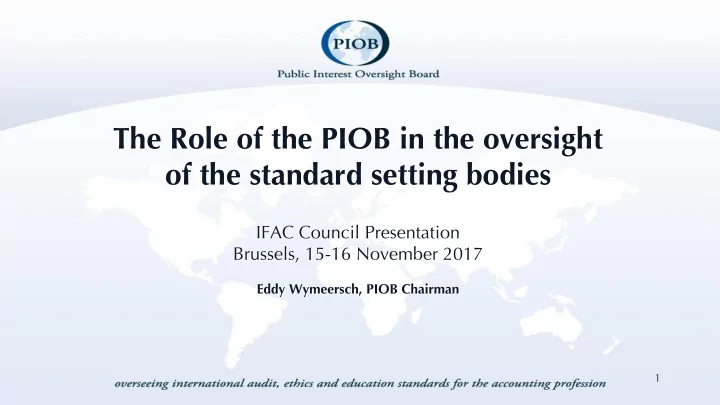

The Role of the PIOB in the oversight of the standard setting bodies IFAC Council Presentation Brussels, 15-16 November 2017 Eddy Wymeersch, PIOB Chairman 1
Standards and the Public Interest • ISA • Ethics • Education Public Interest • – Why is oversight needed? – What is Public Interest – can you define it ? – Not proper to accountant’s standards • See recent: competition law, Recovery and Resolution for Banks • Case law: frequent use to deal with behavior against specific parties 2
Standards for auditors create public good • Confidence in quality, credibility, reliability of Financials • Many people rely on these characteristics ▪ Capital markets, investors ▪ Investment manager ▪ Competition in markets for goods and services ▪ Distribution of credit, confidence of creditors ▪ Business taxation ▪ Labor negotiations ▪ Macro- financial stability - see ISA 540 and NPL 3
The place of the Public Interest • We need a solid accounting and auditing system, a well functioning accounting profession and this to allow our economic systems to thrive. • This is needed to serve the “Public Interest” • See: the Code of Ethics “a distinguishing mark of the accountancy profession is its acceptance of the responsibility to act in the public interest”. 4
The Role of the PIOB • Oversee whether this Public Interest objective is achieved • Several forms of Public Interest oversight 1. Technical characteristics of PI oversight Composition of Boards and approval of nomination of board members • • Approval of strategies work programs of Boards • Monitoring development of standards and see that all positions are taken on board – Public interest in the development of standards – Does the standard achieve the stated objective – Is the standard consistent with other standards – Can it be applied by all firms, large and small – Is the standard clear enough and not too complex, etc. 5
The Role of the PIOB 2. Does the standard respond to the interests of society • Have all parties been heard: global consultations revealing different sensitivities • But is this sufficient? • Due process is only part of the solution • Not all stakeholders gave their input • Unbalanced outcomes • Uninformed participants • Gaps • More is needed: external independent oversight to ensure PI is respected • PIOB is not the executive arm of the MG – Adopts its decisions independently • IFIAR verifies the application of the standards: ex post 6
External independent oversight is needed (1) • Different approaches: 1. Ensure that the “fundamental principles” of the profession are respected - if not, stakeholders will lose confidence 2. Interests of stakeholders not rightly balanced: mostly in favor of profession • Due to the composition of the Standards setting boards. 3. Wider long term interests than the expressed interests of stakeholders as these are mostly short term interest 7
External independent oversight is needed (2) • See in the Ethics Code ”Fundamental Principles” – Integrity – Objectivity – Independence – Professional competence, diligently, apply standards – Confidentiality – Compliance with laws and regulations • The discrepancy and risk to stakeholders have to be considerable • PIOB does no micromanaging, no drafting of standards • Only steps in if considerable discrepancy 8
Some applications • Management and leading shareholders may prefer that no statement on “ going concern ” is made by the auditor, but the creditors and society at large requires transparency by the auditor who has come the closest to the reality in the entity. Auditor reporting standard to be adapted. • NOCLAR : “Responding to non - compliance with laws and regulations” – Refusal to report to authorities in the name of confidentiality – Extensive company internal action by the auditor, sometimes without result – PIOB requested report except in case of physical to auditor 9
Some applications • Long Association – Cooling off for engagement partner for 5 years • But several exceptions e.g. continuous limited activity – familiarity threat • Dropped 10
Conclusions • The Accounting profession contributes to the public good • The PIOB seeks to ensure that PI is pursued in the standards • This is not an easy task, requires a lot of judgment by an external independent international body without any bias • The PIOB is working on a Public Interest Framework as part of the MG reform • The PIOB’s objective is not to curtail to profession, but to strengthen its critically important role 11
Recommend
More recommend